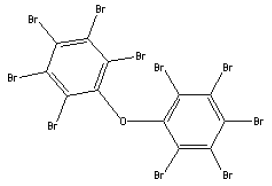Mapping of decabromodiphenylether (decaBDE) in other products than electrical and electronical products
2 Introduction to decaBDE
2.1 Introduction to decaBDE
Decabromdiphenylether (decaBDE) is a polybromsubstituted diphenylether (CAS no 1163-19-5).

The substance belongs to the group of brominated flame-retardants. This group of substances have found great use to fire protection of inflammable materials. The substances have in particularly become increasingly popular for fire protection of electronical products where the combination of inflammable materials (often plastics) and heat from the electrical parts form an ignition risk. Furthermore, the substance is used for fire protection of other inflammable materials.
A Danish investigation from 1999 (the Danish EPA 1999) estimated that the annual Danish use of brominated flame-retardants at 300-600 ton. Hereof it was estimated that the group of polybrominated diphenylethere (PBDE), as decaBDE is a part of, accounted for approximately 12%.
Brominated flame-retardants accumulate in nature and thus in the food chain. Some brominated flame-retardants are furthermore, suspected of having negative health effects. DecaBDE is thus e.g. on the EU’s list of substances that are regarded potentially hormone-disrupting. During the recent years the group of brominated flame-retardants, including decaBDE have be subjected to a number of investigations for this reason, and regulations and measures have been introduced with the purpose of limiting the use of the most critical brominated flame-retardants.
2.2 Regulations
According to the RoHS Directive and the associated Danish regulation (Danish Ministry of the Environment 2004a) DecaBDE is banned in electrical and electronical products. However, this ban is invalidated for decaBDE´s at the Commission’s decision from the 13th October 2005 (EU Commission 2005). Denmark has appealed this decision to the European Court of Justice with a view to make the decision void.
The substance is used as brominated flame-retardants in other consumer products than electronical articles. Currently, there is no further regulation of the use of the substance in Denmark.
Sweden has introduced a total ban on use of decaBDE in all products effective January 1, 2007, however, the regulations in the ROHS directive are observed with the provisional exception.
Other examples of brominated diphenylethers are pentabromdiphenylether and octabromdiphenylether that are both banned marketed according to Regulation no 76 of 9 February 2004 (Danish Ministry of the Environment 2004b).
DecaBDE is not manufactured within the EU; however, it is imported as both a chemical, part of semi-finished products, and as content in finished products.
Version 1.0 August 2007, © Danish Environmental Protection Agency